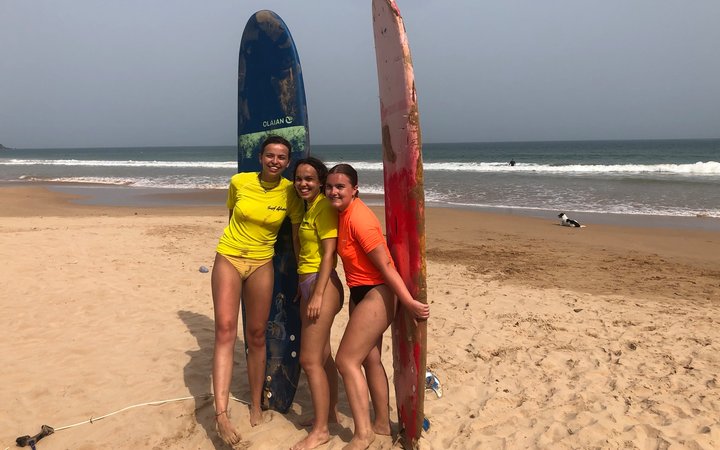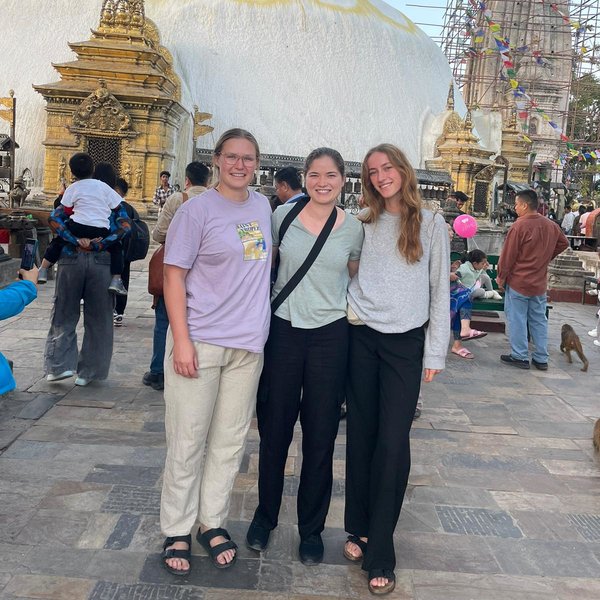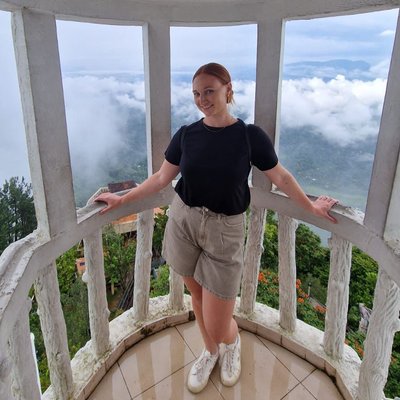University of Graz 2022
 The reason I wanted to do an overseas placement in a low-resource hospital wasn’t to go and change anything. It was more about learning about how they did midwifery in the context of the local culture.
The reason I wanted to do an overseas placement in a low-resource hospital wasn’t to go and change anything. It was more about learning about how they did midwifery in the context of the local culture.
I wanted to go during my studies, but the pandemic meant that I had to postpone the trip. I still really wanted to have the experience, so I went ahead with it anyway. I’m really glad I did because it was one of the best experiences of my life.
Before the trip I was so excited. It didn’t really feel like it was happening until I was on my way to the airport. The first time I thought, “Am I really sure I want to do this?” was when I was on the plane to Ghana! There was no turning back at that point, though.

I got off the plane and one of the Work the World staff members was there waiting for me. My first impression was that I’d made the right decision. He was so welcoming and open, and felt like someone in my family who I hadn’t met if that makes sense.
Travelling back to the house was really something. Most people arrive late at night, but I landed in the afternoon, so it was still daylight. It was a long drive to the Work the World house, but we drove through Ghana and it was a nice first experience to see so much of the country passing by the window.

The next day, we went for a tour of Takoradi, which is the city where Work the World is based. And that afternoon we went to our placement hospital for the first time to do some introductions before we started our placements the following day.

It was so different compared to Austrian hospitals. But because of the preparation we had done with Work the World before we left, and because of all the information in the online packs we received, I felt prepared for this. It wasn’t a huge culture shock like it might have been if we hadn’t done that kind of preparation.
 The first things I noticed about the hospital were that it was very basic, and the people there were so friendly and open. I could tell it was going to be a good placement even on day one.
The first things I noticed about the hospital were that it was very basic, and the people there were so friendly and open. I could tell it was going to be a good placement even on day one.
When we got into the placement over the weeks I was there, that lack of resources that I noticed at the beginning really showed up in practice. Labouring women had to bring all their own supplies to the hospital. Pads, clothes for the baby, nappies… Everything.
The other big difference was that things were much more about money. There were some things that if a woman couldn’t afford it, she couldn’t have it. Even something that would be basic for us, like an ultrasound.

And with the practice itself, they were more concerned about things like bleeding after birth. They really wanted to prevent it so they would pay more attention to it than we would. One noticeable difference was that they always did manual removal of blood clots and that’s not something we would do.

Women were always alone during birth too. So there was no direct help from the local midwives. They didn’t help with breathing, or help them into different positions like we normally would in Austria. The midwives really did want to do the best for the labouring women, it’s just that in Ghana there’s a different idea of what’s best for a labouring woman. It was just their way of doing things.

There were some things that were difficult to see. When it came to resuscitation they had a different way of doing it. They didn’t give oxygen as quickly as we would, so the first five minutes after birth always felt more like half an hour.
In general the management is much slower than I was used to. When there was an emergency, it wasn’t dealt with in the same way or at the same speed or sense of urgency we have in Austria. If a woman needs an emergency c-section, she still might have to wait half an hour for it.

There were so many positive experiences as well. I spent a lot of time with labouring mothers, sitting next to them and holding their hands. After birth it was great to hear the women saying that they were grateful for me being with them and that I helped give them strength. I was surprised how much of a difference something small like that made.

One thing I would say if you’re thinking about doing a placement like this is that you get out of it what you put in. So you have to be proactive and make an effort with the hospital staff. I was always asking questions and getting myself involved. The local midwives are really welcoming, but they won’t hold your hand. You have to get out of your comfort zone and put yourself out there.

Once you do that the midwives really start to respect and trust you and you will have a much better experience than if you sit in the corner and wait for something to happen. One of the midwives even invited us to their home for dinner. It was a great experience and I think it came from us being outgoing and friendly.

Something else important to say is that you shouldn’t try to put yourself in an upper position, like you know better than local midwives. The point is you don’t know the culture and what the reasons behind why things are done the way they’re done.

When we weren’t in the hospital we went exploring all over Ghana. My favourite experience was going to Mole National Park. It was a long trip, but it was the best. We drove 18 hours up to the north of Ghana, stopping overnight to break up the journey. It was so worth it — we saw wild elephants on the plains, monkeys roaming around, crocodiles… there was so much I don’t know where to start.

We spent quite a lot of time at Busua Beach too. You might not imagine something like this being in Ghana, but it’s a beautiful beach where you can go surfing. We actually went there three times, and the last time we went they had an Independence Day festival. It was quite different to the kinds of festivals we have, but a lot of fun. It was like a big party in the evening and into the night with lots of dancing. It was such a good time.

The people of Ghana are amazing. I miss them a lot because they’re very genuine and say what they think and feel, but they’re also life loving.

You shouldn’t miss out on a trip like this. It’s really something you’re only going to do once and I really recommend it. I would also say that if you’re thinking about travelling on your own, there’s nothing to worry about. As soon as I got to the Work the World house there were so many people there that going alone didn’t matter at all. After a few days my housemates felt more like family.









